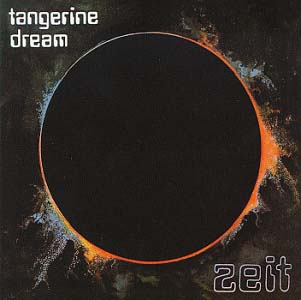In my quest of listening to as many old Tangerine Dream albums as possible, I was delighted that a new version of Zeit, their third album, had been reissued. The album was released in 1972 as a double-LP. It was the first album featuring Peter Baumann (sound generator, organ, VCS3-synthesizer), who joined Chris Franke (keyboards, cymbals, VCS3 synthesizer) and Edgar Froese (sound generators, glissando guitar). The musical style of this album is slower and more atmospheric than Electronic Meditation (1970) and Alpha Centauri (1971). People who like more up-tempo electronic music will have more difficulties to enjoy this album. The atmospheric drone music tone is quite similar to Irrlicht, a solo album recorded by ex-TD member Klaus Schulze that was released in the same month. Originally the music came from a mutual idea by Schulze and Froese. However, they couldn't agree on the music so Schulze left the band. Zeit is truly an album that divides both listeners and fans of TD. Some call it an ingenius album; others say it's a big piece of crap. Or as Mr. Froese states in the booklet: 'you always get a reaction like you'd produced another pack of washing powder.' At first I felt the same after listening to the album, because the music is very mellow and simple without hardly any change of pace or rhythm. However, if you listen more often you'll realize that you need to have a different approach to digest this type of music. The album opens with the first movement Birth Of Liquid Plejades. The first notes are performed by The Cologne Cello Quartet. Every now and then, you'll hear these cellos played by Christian Vallbracht, Joachim von Grumbcow, Hans Joachim Brüne and Johannes Lücke. Eventually the cellos disappear and what's left is a Moog-synthesizer played by Florian Fricke (Popol Vuh) with an organ in the background played by previous TD-member Steve Schroyder. This piece ends with some Pink Floyd-sounding organ parts. The second movement Nebulous Dawn contains only electronic effects. The third movement Origin Of Supernatural Probabilities contains mainly one long sinister sounding drone with more electronic effects. The title track basically sounds like the middle-section of Pink Floyd's Echoes : wind sounds blended with guitar glissandos and electronic effects from the VCS3- synthesizer. Zeit is based on the philosophy that 'time' - the English word for Zeit - is in fact motionless and exists only in our minds. The album cover depicts a solar eclipse which in a way reflects this philosophy. Devotees of dark ambient music often refer to this album as being one of the first examples of the genre. The new release of Zeit contains a bonus disc as well featuring the same music as the Zeit-release of 2001 namely the recordings of a concert given in November 1972 during the Klangwald-concert in Cologne at the WDR Sendesaal in Germany. It was previously released as Tangerine Tree 52: Cologne 1972. Tangerine Tree was a project from 2002 through 2006 dedicated to the collection, preservation and distribution of unreleased concerts and other audio material by the band. The creators of the Tangerine Tree-project received permission from TD to release the collection on a strict non-profit basis. Several of the Tangerine Tree-volumes have been used as a basis for official TD-releases. The project collected about 300 hours of material derived from audience recordings, soundboard recordings and recordings from radio and TV-transmissions and in some cases from the purchase of studio masters. This nice extra contains the same kind of music as on the first disc, but this time only Froese, Franke and Baumann can be heard. During this radio performance they were finally able to showcase their new approach to live performances. All of their traditional instruments were gone and replaced by new Farfisa-keyboards, two EMS Synthi-A synthesizers and various effect units. Again the Pink Floyd sounding organ parts are present especially on the first part of Klangwald. On the second part the glissando guitars have a more prominent role, although Pink Floyd's Echoes is never far away. In a way you can say that the musicians improvised a lot on the music recorded for Zeit. This kind of music wasn't always understood by the people that attended their performances. During a gig in Mönchengladbach they were booed off the stage. Maybe the best way to listen to this music is the way DJ John Peel approached it. After listening to fifteen to twenty new albums he and his wife sat down and listened to Zeit before they went to bed. It cleared all the muck out of his head. For TD, the album was a never to be repeated experiment, as they pushed onto the more sequenced and mass-audience friendly rhythms as you can hear later on Phaedra and Rubycon. For me, Zeit certainly doesn't belong to my favourite TD-releases. The album has its moments, but you just have to be in the right mood to listen to this kind of ambient music. ** Henri Strik (edited by Peter Willemsen) Where to buy? |
